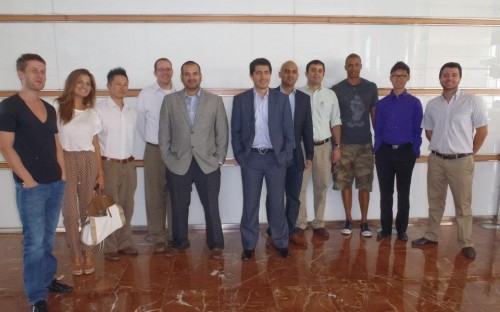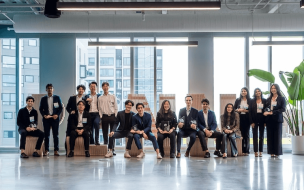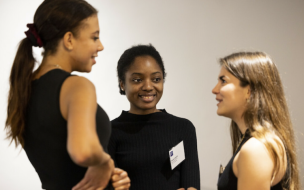This is a guest post by BusinessBecause member Ajay Swamy
Hello everyone! I’m Ajay Swamy, a Global MBA student from IE Business School. Recently, I had the opportunity to travel to Sao Paulo, Brazil with a few of my GMBA colleagues. It was a fantastic 360 degree experience! We had the opportunity to attend seminars at INSPER and visit a few companies as well. The trip provided us with an in-depth understanding into Sao Paulo & Brazil’s economy and the abundant market opportunities that persist in the region.
Brazil, the 5th most populous country in the world and firm member of BRICS commands the 7th largest economy in the world. Despite recent economic slowdown the country is poised for high growth across various sectors. The first day we had to chance to visit Odebrecht, the 4th largest firm in Brazil with businesses in energy, engineering and construction industries. We had the distinct pleasure of listening to the CFO of the $50B firm who discussed the company’s tremendous growth and the challenges of maintaining a sustained growth rate around 10% YoY.
Odebrecht’s corporate strategy is based on solidifying key positions in markets with a predominant Portuguese influence. This is a remarkable strategy where the company can exploit the influence of the Brazilian government while leveraging from similar cultures which eases cultural challenges. We also participated in an open meeting with the CMO of LG, Brazil – where we touched upon the difficulties of marketing to Brazil’s various economic classes- A,B,C,D,E with A being the wealthiest and E the poorest. However the aggregate affordability of the D & E classes is huge which means most companies market directly to these classes.
This tactic of offering products to the poorer classes draws a direct comparison to Prahalad’s paper – “Serving the world’s poor, profitably” – a brilliant strategy that companies & entrepreneurs can exploit in Brazil which is made easier by the huge popularity of installment / subscription based payment methods.
We also attended various lectures at INSPER that focused on Brazil’s complex, intertwined corporate and political frameworks and the ensuing entry barriers it creates for foreign firms that want to venture into this market. Essentially Brazil is prone to complex corporate alliance that results in deep relationships with the government, other firms, cross shareholding and sometimes collusion. The direct comparison can be made to Keiretsu– albeit a more convoluted one in Brazil’s case. It is as the lecture was titled – a “Capitalism of Ties”. Other lectures focused on cultural, macro & micro challenges as well
as various sustainability seminars.
The second presential session from IE Business School brought about a deep understanding of another major emerging market in addition to the previous one held in South Africa. Most of all it brought us closer together as a group. In addition to the course work in Sao Paulo, we also had to keep up with our regular MBA course loads. And yes, we made time to explore the abundant nightlife and culinary options that Sao Paulo offered. Trips like these really open you up to think about interesting business challenges from both economic and cultural perspectives. The exposure and learning experiences offered via presential sessions is unique, fulfilling and makes IE Business School’s Global MBA experience comprehensively international and complete.
To end, I leave you with a few quotes from my colleagues who joined me on this trip:
Davy Sohi: The trip to Sao Paulo was a fantastic opportunity to discover the city and learn more about Brazil and the intricacies of its economy and culture, all whilst networking with fellow IE alumni and
Paolistanos.
Thien Le Nguyen: The IE sponsored trip to Sao Paulo was a fantastic opportunity to not only learn the ins and outs of one of the most vibrant emerging economies in the world but also to network and develop a
stronger personal relationship with my fellow classmates. The trip was a once in a lifetime opportunity that I won’t soon forget.
Aaran Joneson: This opportunity from IE helped the student network and build personal relationships all while seeing first-hand how diverse Brazil is, economically and socially. It was very eye-opening to
see the effects of outdated protective trade-laws and how they influence the mixture of poor to wealth, where huge companies have skyscrapers built right alongside run-down shacks.
Special Thanks to Laura Rojo, Vani Nadarajah, Carmen Garcia and Alvaro Garcia Soto.
RECAPTHA :
58
94
a7
5f







